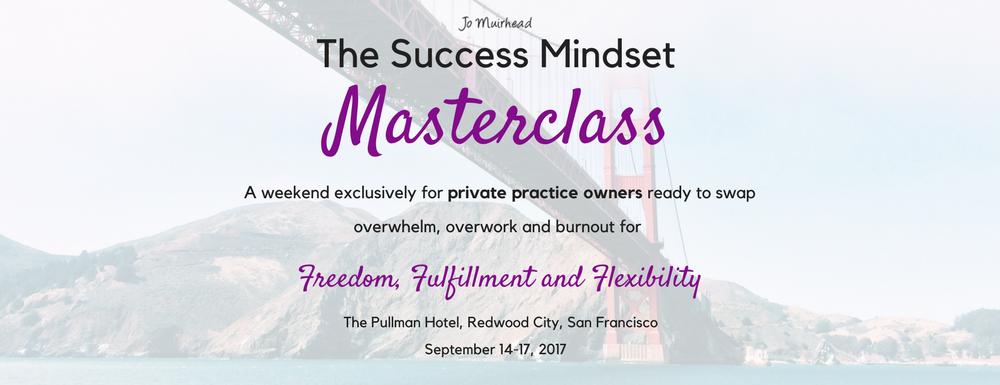“Personality is to a man what perfume is to a flower’ – Charles M Schwab.
There are SO many definitions of personality, its role, and how it functions. There are some schools of thought that suggest it’s fixed, something we are born with that will not change, and others who propose that personality can change over time…
And… I’m not going to spend this post trying to come up with a catch-all definition of personality. That’s not what we’re here for today.
Because what we REALLY need to talk about is whether your misconceptions about YOUR personality are causing issues for you in your private practice.
And why might that matter? Well, personality is a pretty darn good (but not the only) predictor of behaviour.
It’s not the only thing we need to be aware of when cultivating a successful private practice – but it is an important and often neglected factor of being able to create the platform for success that is going to work for you. Like I explained in last week’s blog post, you can’t simply put on someone else’s mindset for success – it will be like a pair of pants that weren’t made for you.
Check out this quote from Mr Bruce Lee: “Always be yourself, express yourself, have faith in yourself, do not go out and look for a successful personality and duplicate it.”
So why is it that I keep seeing the same things show up again and again for private practice owners? Things like…
- Feeling like you CAN’T do or accomplish X because of your personality
- Or spiraling out of control and into overwhelm at what seems like the tip of a hat (we call this “carrying on like a pork chop” here in Australia!)
- Or behaving in counter-productive ways because doing so comes like second-nature…
And then recognizing this behaviour and saying – OH – this is just who I am!
STOP with the excuses people. STOP IT!
One of the most common ways we assign personality traits is the old Introvert versus Extrovert dichotomy. Im sure that we are all familiar with this and it’s a great place to start understanding how personality is a great tool for predicting behaviour.
One common MYTH of personality is that Introverts can’t be successful Private Practitioners or business owners, because you apparently have to be an Extrovert to be able to be successful in marketing and sales.
Well the rise of so much online training around how to tap into your introversion should tell you that being an introvert won’t stop you from being a successful anything unless you don’t actually want to be successful, or unless you don’t believe that you can be successful. It doesn’t have anything to do with whether you are an Introvert or not.
And how about this list of the 23 Most amazingly successful introverts in History:
Albert Einstein
Rosa Parks
Bill Gates
Steven Spielberg
Sir Isaac Newton
Eleanor Roosevelt
Mark Zuckerberg
Larry Page
Al Gore
Marissa Mayer
Abraham Lincoln
JK Rowling
Warren Buffett
Mahatma Ghandi
Hillary Clinton
Michael Jordan
Charles Darwin
Meryl Streep
Elon Musk
Dr Seuss
Frederic Chopin
Steve Wozniak
Barack Obama
Source: https://www.inc.com/john-rampton/23-amazingly-successful-introverts-throughout-history.html
It might surprise you to know that I too am classified as an Introvert. Yes – I am. And this is what well meaning clinicians like to say about my introversion…..
- You’re a great public speaker – I could never do presentations like you. You must be an Extrovert
- You’re always doing videos on FB, you can’t be an introvert
- You hold a room really well, and do a powerful job with everyone in the room — that’s what an Extrovert does.
- You are so gregarious and love people, people are naturally drawn to you so you must be an Extrovert.
And thank you for those compliments. Yes, to all of them. However I am only able to be and do all of these things, because I am comfortable with who I am and can own my introversion.
I also know that I can put on “extrovert” for a short time to be able to achieve a specific outcome. I know this comes at a cost, like the need to be by myself for three days after an event.
But there is more to personality than simply Introvert or Extrovert (and let’s not even start talking about ambiverts). There are so many tools on the market that claim to assess personality. I’ve used many of them, but it really comes down to a handful of factors that determine how useful personality tests are to you and your business:
- How can I work with this person so that it is a great experience and a success for them?
- How do I get the best out of this person?
- How do I set us this conversation for a successful outcome?
- how can I de-escalate tricky situations and keep everyone engaged and people leaving heard and respected?
Basically, I use a personality inventory to help me understand how a person may behave. I like to know how a person may behave especially when they are stressed and under pressure. Once I can shed some light on these features of their personality and behaviour, then we can choose to make things work in a way that brings them success.
Here’s an example for you…
I have been working with a gentleman for a couple of years. He is what many people would describe as a strong personality. He is “out there” – he knows what he likes and he knows what he doesn’t like, and he isn’t afraid to express that. However, he had very little insight into why he would get so freaked out every time he felt a minor “stretch” in his finances.
He was making already very good money, and together we doubled his revenue in less than 12 months, pushing him to$300K p.a. revenue as a clinician in private practice. Sounds like a dream, right?
Well..
He had this almost bizarre behavior. Every 6 weeks or so, he would turn up in my inbox telling me he was a failure and that he had to stop working with me. This was confusing, because usually the week before this occurred he would agree to do something that was a bit of a “risk” and something that would get him outside of his comfort zone. None of these activities were ever prescribed by me by the way, that’s not how I work. He decided that he wanted to do them, we thought through the consequences and he put things into action.
Then he would freak out, freeze, and go small again and would need a lot of attention. A LOT of ATTENTION…..Woah, Nelly!
A week later, almost as soon as it came on, it was gone again and everything was sweet and things were all settled again. In my desire to understand him, I started looking for patterns, and I started keeping a bit of journal of his behaviour, and we worked out that he had a 6 week cycle going.
We identified that every 6 weeks, his cash flow would take a dip, not tragically, not to the point where he couldn’t pay his expenses or his staff, but it would take a dip, and to this person any dip meant he was failing. He was out of control, he was scared, he was insecure and he needed some way to understand that this cycle could change.
When I reviewed his E-DISC personality inventory with him (more on that below), his behaviour became perfectly clear. His personality Type is an “S” – and this type of personality likes stability and security and therefore needs help with change. Interestingly enough, an S style of personality may also be perceived as slow, stuck in their ways, and stubborn – and believe me I had experienced all of those attributes.
So, we identified that when he was feeling under pressure or stressed, for example, when he felt his finances were tight, he would revert into unresourceful or unhelpful ways of behaving, and that would inevitably perpetuate the cycle of unresourceful and unhelpful behaviour.
Now that we knew what was happening we could do something about it..
The action that was taken here was:
- to have a floating profit and loss (P&L), basically a spreadsheet that with every transaction in the business could tell this person exactly what the state of this business finances was.
- to have someone else in charge of the data entry and reporting on the floating P&L because like me, this person would become terribly confused and overwhelmed by all the detail.
- to have a weekly management meeting with his practice manager who would as a part of this meeting report on what expenses were coming up and do some basic financial forecasting.
Funnily enough, this client never spoke of this issue again, apart to tell me how much excited he was at the new toys he could buy in his business and that he loved working on the numbers in his because now, his numbers had set him free.
What I knew was this client needed to feel safe and needed stability. Having a tool that provided black and white answers, something that was easy to read, and easy to glean accurate data from that was put together by a third party was the best answer for this client. It freed him up from feeling like the project was too hard; and gave him the peace of mind to know, oh yeah we are tight this week, but wow look at what is expected to come in next week.
Thank you personality types for your useful prediction of behaviour.
I really like the E-DISC tool (which is different to the DISC without the “E”). But it’s not the best tool, and it’s not the only one that offers any value. I have always maintained a position that any personality or psychometric test is only ever as good as the person interpreting it. However the E-DISC works well for me and my clients.
That is why everyone who comes to the Success Mindset Masterclass will get their own E-DISC assessment, a 24 page report and a 1:1 debriefing session with me (before the masterclass weekend) so we have some insight into how the event is going to work best for you AND how you can start working WITH your natural personality style in your business… rather than against it.
Let’s wrap this up……
Knowing yourself is a foundation for the ability to create a platform for success.
You can’t simply copy someone else’s personality or their coping style or their behavioural profile or their core needs. It won’t work for you.
We can’t create a formula that says, “have all of these attributes and then you will be successful” – because it doesn’t exist.
You can, however, learn about who you are, how you will best perform under pressure, and how to get the best out of yourself. When you have this sorted , then we can lay the foundation to grow a mindset for success – YOUR SUCCESS.
You can’t pretend to have a mindset for success – you must build one.
Understanding YOU is the first module of the Success Mindset Masterclass happening on September 14-17, 2017 (early bird seats are now on sale, and you can save $300 on the price of your seat).

Learn everything you need to know about the masterclass here.
Here’s to your success,
~ Jo


